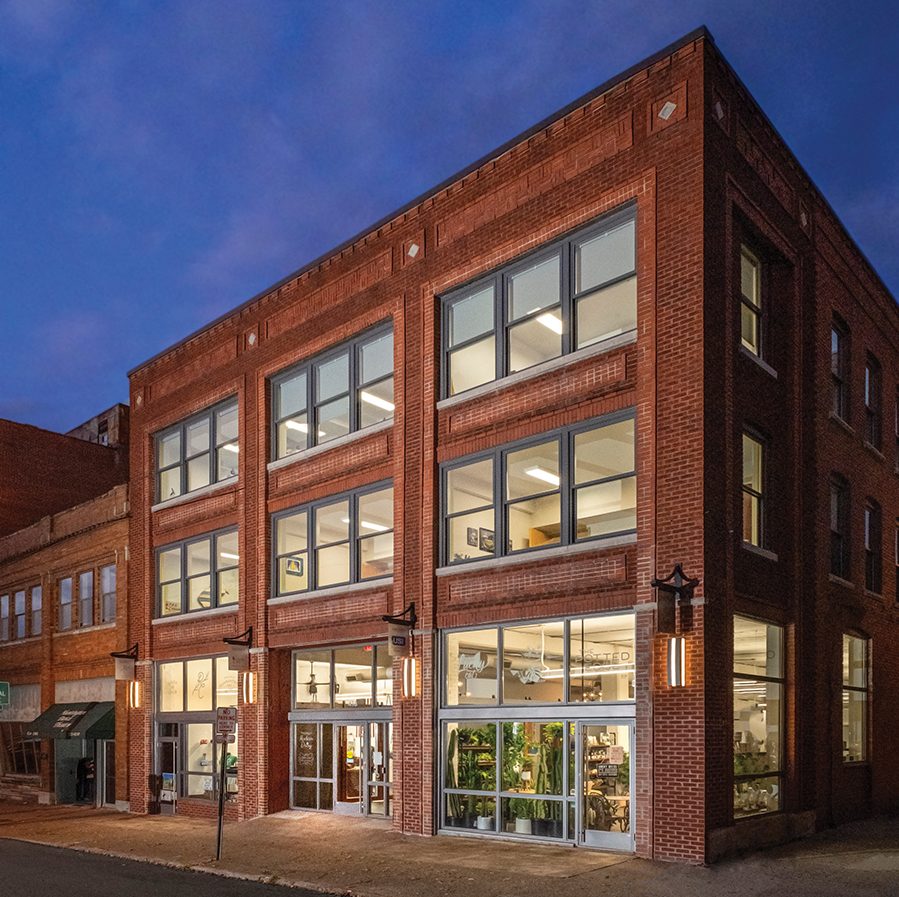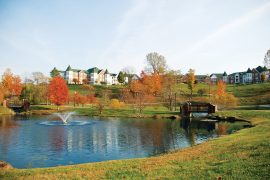Justin and Phoebe Randolph breathe new life into a 100-year-old building and hope their success will be a harbinger of things to come for downtown Huntington.
By Jean Hardiman
HQ 111 | AUTUMN 2020
Breathing new life into a 100-year-old, 12,000-square-foot building in downtown Huntington is a project that takes a lot. It takes a lot of expertise in everything from construction to financing to design to marketing. It takes a lot of commitment. It takes a lot of hope. And, it takes a certain amount of courage.
Not everyone is willing to take on all these challenges at once, but Huntington is fortunate. It has Justin and Phoebe Patton Randolph, a development power couple who proved through their joint project, the Progress Building, that good things come to those who know their way around a project like this, and who believe in the city of Huntington.
Justin Randolph, a general contractor who runs Cardinal Builders Inc., and Phoebe Randolph, an architect who is a principal at Edward Tucker Architects in Huntington, knew that if they found the right structure in the right location, they could help bolster some small businesses and give downtown Huntington a boost in the process.
“We saw other developers investing successfully and thought it was a reasonable risk to take — but it definitely was still a risk,” Justin said. “We put everything we have into the project because we believe in Huntington. And we know that without this type of investment, we will never see things change in our town.”
Today, the building located 418 Eighth Street is filled, with the exception of the basement, which is available to a tenant that is a good match for the space.
On the first floor, Encore Rock Movement opened a studio space, Lyn•Zen Microblading relocated from another space downtown and Modern Daisy Boutique opened its first brick-and-mortar location. The Randolphs also recruited three businesses from Gallipolis to open a second location in Huntington — The Potted Edge, Lucky Cat Design Co. and River City Leather.

The Progress Building’s second floor is now home to Legal Aid of West Virginia’s Huntington office, and the third floor is occupied by USI Insurance Services and a new law firm — Appalachian Legal Healthcare Consulting Inc.
“We wanted to ask reasonable rents so that small, local businesses could afford to lease space,” Phoebe explained. “We originally thought of leasing the entire first floor to one tenant, and then realized that a better plan for our area was to break it up into smaller lease spaces to make it more affordable for small businesses. We hope that the first floor will act as an incubator for businesses to get started and eventually move into larger spaces.”
Solar Holler is an example of such a business, which opened on the first floor originally but outgrew the space.
How did the Randolphs know it would work? The short answer is: They didn’t. But a lot of right pieces were in place for success. When Justin closed on the building in February of 2016, he knew that it was a great location and that the building — originally home to an electric supply company that served the mining industry — was well-constructed. It had solid concrete and masonry.

Phoebe liked that the building was a contributing structure within the Downtown Historic District, so it would be eligible for tax credits. She also liked the fact that it was a corner lot that got daylight from two sides.
Putnam County Bank provided financing for the purchase and the original construction loan. Finally, after about six months they were able to begin work, which involved demolition and construction for a new elevator, exit stair, windows and more.
Phoebe put together the project pro forma, handled the interactions with tenants to understand what their needs were and then developed designs that responded to those needs. She developed the construction drawings, obtained the building permit and put together all of the historic tax credit application documentation. That process, which took about three years, resulted in tax credits equaling 30% of eligible expenses.
“The financial viability of the project would have been very different without those credits,” Justin said.
Phoebe added that today developers can get historic tax credits of even more: 45% if you combine 20% federal and 25% state.
As she was handling that portion, Justin managed the construction from start to finish.

“As a licensed general contractor, he acted as owner/developer and contractor,” Phoebe said. “He was on site every day managing the work and delivered every tenant’s build-out on time so that they could move in and open for business.”
Removing the applied stone on the first-floor facade and demolishing the entire interior were among the biggest challenges.
“That meant that we had a long time where we had no revenue from rent, but a lot of bills to pay,” Phoebe said. “That was extremely stressful. But, we were able to get long-term leases from great clients because we were able to build out space for them exactly as they needed, instead of trying to fit them into existing, outdated space.”
They finished most of the construction by 2019. They had no way of knowing for sure if local businesses would lease space, but they were hopeful. And they were right.

“Phoebe has a lot of contacts through her work and community involvement, and we had a lot of people help us get the word out,” Justin said. “We did everything with the idea that we are going to own the building for a long time, and we didn’t want to have constant maintenance issues; so everything is very well-built. We think people responded to the design aesthetic that we used which is authentic to the historic character of the building, with modern touches.”
The couple said it feels amazing to have provided a great location for their tenants in the heart of downtown Huntington.
“The three floors are currently full, which is really exciting,” Justin said. “We do have a space in the basement that would be a great fit for a gym or fitness business, but we are waiting for the right tenant to come along. Mainly we are trying to get the word out about the shops and encourage people to shop downtown to support independent, local businesses.”

While their knowledge of project development certainly surpasses the average married couple, they said there’s a lengthy list of other folks to thank. There was Mike Stephens at Huntington Federal Bank, who worked with them in the middle of the project to refinance their loans and provide the financing to finish the project. Accountant Tomi Weber at Hess, Stewart & Campbell kept track of their accounting and navigating the historic tax credit process. Brandon Doerner at BullRock Realty LLC offered excellent advice on how to attract tenants and negotiate leases.
Steve Golder at Jenkins Fenstermaker assisted with legal consultation. David Smith and Patrick Morris helped with historic documentation of the building.
Then there was the vital support from the City of Huntington, Generation Huntington and the Huntington Regional Chamber of Commerce, which helped market the building and held events to help get the word out.
“As you can see, we had a ton of support from the community,” Phoebe said. “I think that is a key thing to mention to encourage other developers to connect to the larger network of people in the community. People really do want to help, and it really increases your chances of success with these types of projects.”
Don’t overlook Huntington’s potential, they said. Every project has its risk, but as a couple raising two sons locally, they know the importance of looking forward.
“There are so many opportunities to develop quality commercial and residential space in this town,” Justin said. “This project is just one of many examples of that. We hope to see the development of new housing in the future, at all income levels and in a way that complements the character of our neighborhoods.”





